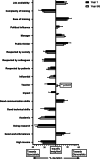Understanding concepts of generalism and specialism amongst medical students at a research-intensive London medical school
- PMID: 35436928
- PMCID: PMC9017034
- DOI: 10.1186/s12909-022-03355-1
Understanding concepts of generalism and specialism amongst medical students at a research-intensive London medical school
Abstract
Background: Many prominent UK medical organisations have identified a need for more generalist clinicians to address the complex requirements of an aging society. We sought to clarify attitudes towards "Specialists" and "Generalists" amongst medical students and junior doctors at Imperial College School of Medicine.
Methods: A survey exploring medical students' beliefs was followed up by qualitative analysis of focus groups of medical students and Imperial-graduate foundation year doctors.
Results: First year medical students associated specialists with academia and higher income, and generalists with ease of training and job availability. Senior (Years 5/6) medical students associated specialists even more firmly with broader influence and academic work, whilst generalists were assigned lower prestige but the same workload as specialists. The medical student focus group discussed concepts of Generalism pertaining only to Primary Care. In contrast, the foundation year doctor focus group revealed that Generalism was now seen to include some hospital care, and the perception that generalists sat lower in a knowledge hierarchy had been challenged.
Conclusion: Perceptions that Generalism is associated with lower prestige in the medical profession are already present at the very start of medical school and seem to be reinforced during undergraduate training. In early postgraduate clinical practice, the perceived knowledge and prestige hierarchy lessens. These findings can help inform curriculum redesign and the promotion of Generalism as a rewarding career aspiration.
Keywords: Career; Curriculum; Generalist; Specialist.
© 2022. The Author(s).
Conflict of interest statement
The authors declare that they have no known competing financial interests or personal relationships that could have appeared to influence the work reported in this paper.
Figures

References
-
- Outcomes for Graduates, General Medical Council 2018. [Online] Available from: https://www.gmc-uk.org/education/standards-guidance-and-curricula/standa... [Accessed 6 October 2020]
-
- Greenaway D. Securing the future of excellent patient care: Final report of the independent review. London: Shape of Training, 2013. [Online] Available from: www.shapeoftraining.co.uk/reviewsofar/1788.asp [Accessed 18 November 2020]
-
- The 2022 GP: A Vision of General Practice in the Future NHS. RCGP 2013 [Online] Available from: https://www.rcgp.org.uk/campaign-home/~/media/files/policy/a-z-policy/th... [Accessed 18 November 2020]
-
- Future Hospital: Caring for Medical Patients. RCP 2013 [Online] Available from: https://www.rcplondon.ac.uk/file/389/download. [Accessed 18 November 2020]
-
- Garibaldi RA, Popkave CMA, Bylsma W. Career Plans for Trainees in Internal Medicine Residency Programs. Academic Medicine. 2005 - Volume 80 - Issue 5 - p 507–512 - PubMed
MeSH terms
LinkOut - more resources
Full Text Sources
Research Materials

